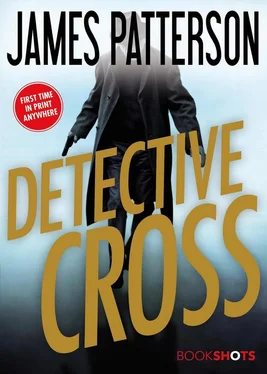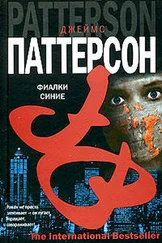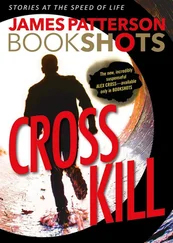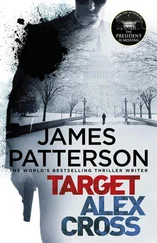“I’m not discounting that. It just seems like this should have been an escalation.”
“Or at least two bombs,” Mahoney said.
“Exactly.”
Before Bree could reply, one of the dog handlers yelled. He’d found something on the north side of the memorial.
“Is your dog on scent?” Mahoney shouted as we hurried toward them.
“No,” the handler said when we got close. “I saw it in that clear trash bag there, a black fanny pack.”
Bree triggered her radio and said, “Bring the bomb team up.”
Within five minutes, FBI bomb squad commander Peggy Denton had arrived. We watched her iPad screen, showing the Andros robot’s camera feed and monitoring several electronic sensors. She shook her head. “We’re not picking up on a radio or cell phone. No timer, either. We can X-ray it.”
Mahoney nodded. Another tense three minutes passed while they moved a portable X-ray into position and looked inside the fanny pack. Aside from a water bottle and a shirt, there was an irregular rectangular item roughly three inches long, two inches wide, and two thick.
“Too wide for a Snickers bar,” I said. “Brownie?”
“Too dense for either of them,” Denton said. “Can’t see any triggering device, no blasting caps, or booby trap lines.”
“Your call,” Mahoney said.
The commander put on her hooded visor, walked the thirty yards to the garbage and retrieved the fanny pack. She unzipped it, reached in and pulled out the object, which was loosely wrapped in dull-green wax paper.
“Shit,” Denton said through her radio headset. “I need a blast can here, ASAP.”
Another of the bomb squad agents hurried toward Denton with a heavy steel box.
“What’s going on?” Bree asked.
“It’s C-4 type plastic explosive,” Denton radioed back as her partner opened the box’s lid. She set the bomb material inside and screwed the lid shut. “Yugoslavian Semtex by the markings on the wrapper.”
“Why didn’t the dogs smell it?” I asked. “Isn’t there something added to plastic explosives so they can be detected?”
“They’re called taggants,” Denton said, taking off her hood and visor, and coming back over. “I suspect this C-4 is old. Pre-1980, before taggants were required under international law.”
Bree shook her head. “Yesterday, the dogs smelled the bombs. Why make just one bomb out of it, but not four? And why leave the uncharged C-4 at all?”
“My guess is he left it as a warning,” I said. “He used plastic explosives with taggant the first time, but that game’s over. He’s saying we can’t sniff him out now. He’s saying he can bomb us at will.”
Tense days passed without a phone call from the bomber. Bree was under pressure from Chief Michaels. Mahoney was dealing with the FBI director.
The only break came from the FBI crime lab confirming that the explosive used in the third bomb was pre-1980 Yugoslavian C-4, and that the triggering devices — all timers — were sophisticated. The work of an experienced hand.
I did what I could to help Mahoney between seeing patients, including Kate Williams, who showed up five minutes early for a mid-morning appointment. I took it as a good sign. But if I thought Kate was ready to grab hold of the life preserver, and I certainly hoped she was, I was mistaken.
“Let’s talk about life after you ran away,” I said, sitting down with my chair positioned at a non-confrontational angle.
“Let’s not,” Kate said. “None of that matters. We both know why we’re here.”
“Fair enough,” I said, pausing to consider how best to proceed.
In situations like this, I would ordinarily ask a lot of questions about documents in her files, watching her body language for clues to her deeper story. Indicators of stress and tension — the inability to maintain eye contact, say, or the habitual flexing of a hand — are often sure signals of deeper troubles.
But I’d had difficulty reading Kate’s body language, which shouted so loud of defeat that very little else was getting through. I decided to change things up.
“Okay, no questions about the past today. Let’s talk about the future.”
Kate sighed. “What future?”
“The future comes every second.”
“With every shallow breath.”
I read defiance and despair in her body language, but continued, “If none of this had happened to you, what would your future look like? Your ideal future, I mean?”
She didn’t dismiss the question, but pondered it. She said, “I think I’d still be in, rising through the ranks.”
“You liked the Army.”
“I loved the Army.”
“Why?”
“Until the end it was a good place for me. I do better with rules.”
“Sergeant,” I said, glancing at her file. “Two tours. Impressive.”
“I was good. And then I wasn’t.”
“When you were good, where did you see yourself going in the Army?”
I thought I’d gotten through a crack, but she shut it down. She said, “They discharged me, Dr. Cross. Dreaming about something that can never happen is not healthy.”
She watched me like a chess player looking for an indication of my next move.
Should I ask her to imagine a future for someone else? Or prompt her to take the conversation in a new direction? Before I could decide, Kate decided for me.
“Are you investigating the IEDs?” she asked. “On the Mall? I saw a news story the other night. Your wife was there, and I thought I saw you in the background.”
“I was there, but I can’t talk about it beyond what you’ve heard,” I said. “Why?”
She stiffened. “Familiar ground, I guess.”
I grasped some of the implication, but her body said there was more.
“Care to explain?”
Struggling, she finally said, “I know them. They’re like rats. Digging in the dirt. Hoping you’ll happen by.”
“The bombers?”
Kate took on a far-off look. It seemed she was seeing terrible things, her face twitching with repressed emotion.
“Stinking sand rats,” she said softly. “They only come out at night, Doc. That’s a good thing to remember, the sand rats and the camel spiders only come out at night.”
The alarm on my phone buzzed, and I almost swore because our hour was nearly up. I felt like we were just getting somewhere. By the time I silenced the alarm, Kate had come back from her dark place and saw my frustration.
“Don’t worry about it, Doc,” she said, smiling sadly as she stood. “You tried your best to crack the nut.”
“You’re not a nut.”
She laughed sadly. “Oh, yes I am, Dr. Cross.”
Wiping at tears, Mickey left the VA Medical Center and ran to catch the D8 Metro bus heading south. He barely made it, and wasn’t surprised to find the bus virtually empty at this late hour.
Breathing hard, Mickey went to his favorite seat, barely glancing at the only two other passengers, an elderly woman with a cane and a heavyset man wearing blue work coveralls.
As the bus sighed into motion, Mickey felt tired, more tired than he’d been in weeks, months maybe. Rather than fight it all the way to Union Station, he pulled his baseball cap down over his eyes and drifted. Feeling the bus sway, hearing the rumble of the tires, he fell away to another time, in a place of war.
In his dreams, the sun was scorching. Mickey had buried himself in a foxhole as the Taliban mortared an advanced outpost in the mountains of Helmand Province, Afghanistan. Each blast came closer and closer. Rock and dirt fell and pinged off his helmet, smacked the back of his Kevlar battle vest, made him cringe and wince, wondering at each noise if his time was finally up.
Читать дальше












